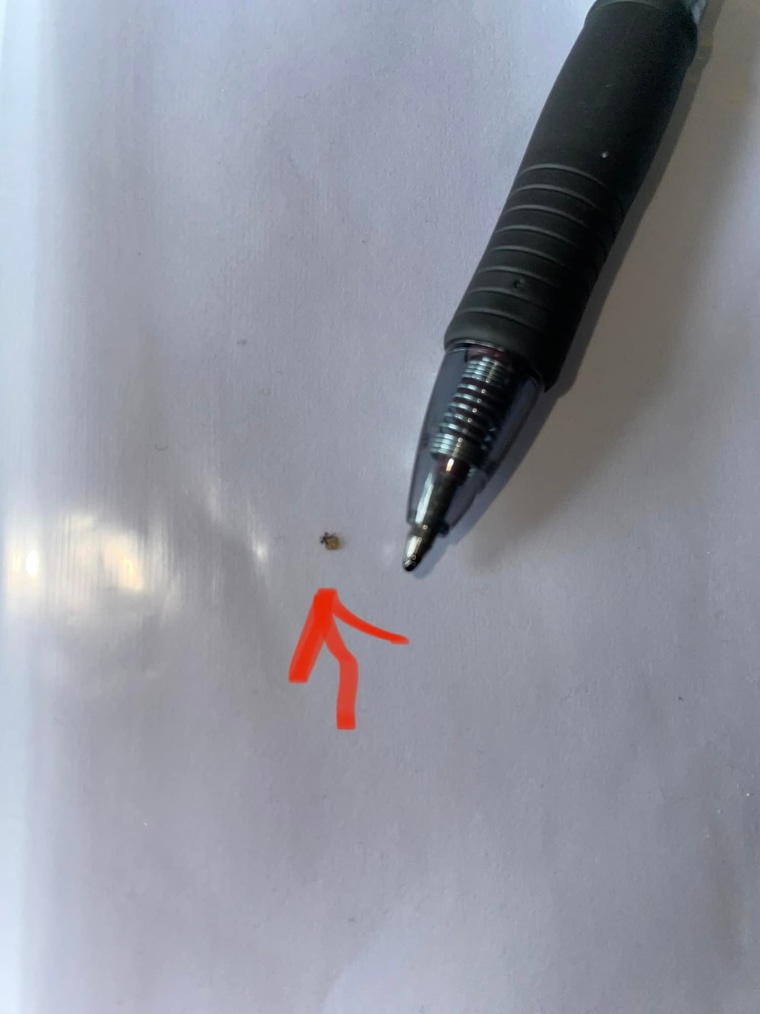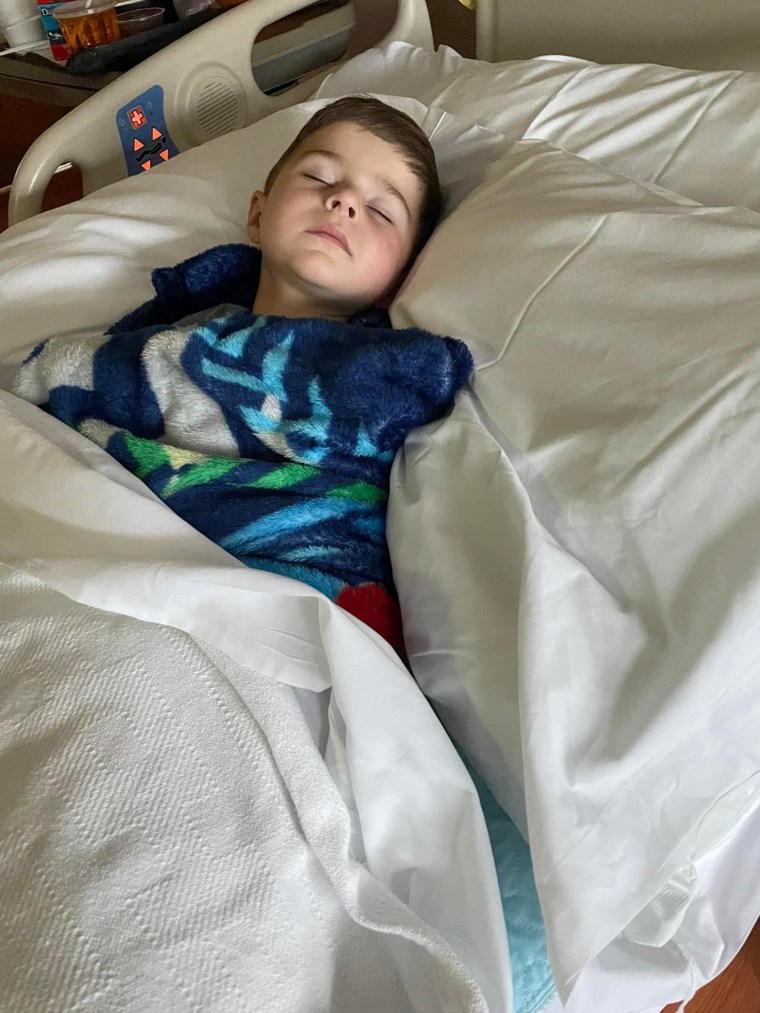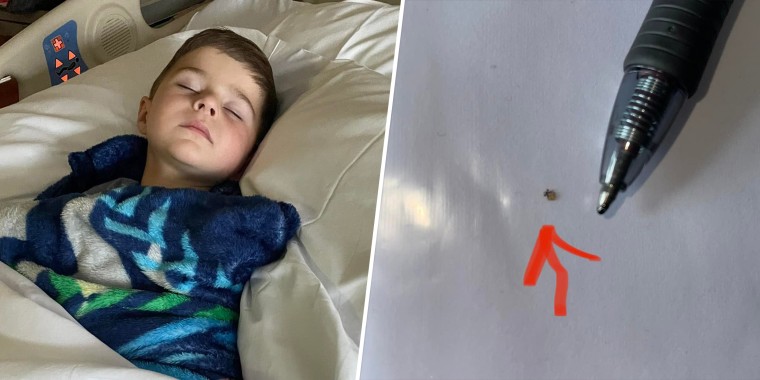A Pennsylvania mother is warning other parents about the dangers of tick-borne disease after her 3-year-old son contracted Powassan virus from a tick bite.
It led to inflammation of the boy’s brain and the surrounding tissues, turning a rambunctious, healthy child into a lethargic, feverish pediatric intensive care patient in a matter of days.
Jonny Simoson is doing much better now, but the effects of the frightening ordeal — including weakness on his left side and speech differences — linger, his mom said.
“We’re optimistic that it will improve with time,” Jamie Simoson, 38, told TODAY. “Unfortunately, we just we don’t know. I don’t think anyone knows. It’s so rare and there’s so little research done on it, I don’t think we can answer those questions, which is terrifying.”

Jonny loves pepperoni pizza, peanut-butter-and-Nutella sandwiches, playing with friends and swimming.
On June 15, he and his mom were at a neighbor’s pool in Harveys Lake, Pennsylvania, where the family lives. As the boy was about to jump into the water, Simoson noticed speck on his right shoulder blade. It turned out to be a tick, which she quickly removed with tweezers.
Living in a wooded area, the family is all too familiar with ticks — Jonny’s 10-year-old sister tested positive for Lyme disease in 2019, Simoson said — so they’re very vigilant about checking the kids for the parasites.
But the family had never heard of Powassan virus disease, a rare illness spread by infected ticks. There were only 20 cases reported in 2020, the most recent year from which statistics are available, mostly in the northeastern states and the Great Lakes region, according to the Centers for Disease Control and Prevention.
The virus can cause infection of the brain or membranes around the brain and spinal cord, with symptoms appearing one week to one month after a tick bite, the CDC noted.
On June 28, almost two weeks after Jonny’s tick was removed, his daycare called to report he was mopey, didn’t want to eat lunch and was “not acting himself,” Simoson said. For the next day or so, he complained of a headache and was miserable. The boy was tested for COVID-19, but the result was negative. Tests for strep throat and tests of his urine were negative, too. His pediatrician suspected something viral that needed to “run its course,” Simoson recalled.
But when Jonny developed a fever of 104.3, there was also a suggestion he might need IV fluids in a hospital.
“At this point, I’m falling apart at the seams,” Simoson recalled as she and her husband rushed Jonny to the local emergency room. “I was adamant every single time we talked to someone that he was bitten by a tick… but he was negative for Lyme disease.”

Doctors did more tests, including a chest X-ray and stomach ultrasound. Blood work showed Jonny’s white blood cell count was 30,000, at least three times more than normal, indicating an infection. He was admitted to the hospital on July 1.
A lumbar puncture was done to test the boy’s spinal fluid and the results pointed to viral meningitis, Simoson said.
She and her husband called July 2 “the absolute worst day.” Jonny was limp in her arms when she held him. The local hospital recommended transferring the boy to a children’s hospital in Danville, Pennsylvania, about an hour-and-a-half away. They got there in an ambulance and the family was met with a flurry of activity. Jonny’s heart rate started to slow and doctors were worried about his altered mental status.
“When they took him for the CT scan, we absolutely did not think that we were coming back with our son,” Simoson said.

To the couple’s great relief, the scan ruled out a brain bleed. Then, an MRI provided a diagnosis: meningoencephalitis — inflammation of the brain and surrounding tissues. Doctors described it as a combination of meningitis and encephalitis, Simoson recalled. A treatment called IVIG — intravenous immunoglobulin — could help.
On July 4, about 15 hours after Jonny received the first dose, Simoson suddenly heard him say, “Mommy, is that pepperoni pizza?” It was the first time he had talked in three days. The boy was awake and looking at a cart in the room that looked like a pizza box.
“That was the first point since we went into the hospital that we really knew deep down that he was going to be OK,” Simoson said. “We finally got a glimpse of our child before this had all happened. We both fell apart.”
Jonny was released from the hospital on July 12. But the real reason for his ordeal wasn’t known until a few days later when continued testing of his spinal fluid showed he was positive for Powassan virus, his mom noted.
“I called my husband and said, ‘You’ve got to be kidding me. The whole time it was that stupid little tick. I knew it,’” she recalled.
“I Googled it and I was like, what the heck is this? What are the chances?”

Jonny wasn’t able to walk at first, had trouble with balance and showed signs of cognitive regression. But there’s been much improvement since and he’s walking on his own, swimming, laughing and playing, his mom said. Still, his speech is different and he has left-side weaknesses.
“His doctor said his brain was injured, it has to heal and that affects everything,” noted Simoson, who has been documenting the family's journey on Facebook. “We’re optimistic that it will improve with time… Overall, we see Jonny again, it’s just amazing.”
Families need to be aware that tick-borne disease is real and preventable: Check your children for the parasites, be vigilant and pay attention, she urged.
“Most importantly, advocate for your kids,” Simoson added. “If you feel like something is not right, you need to push for answers. The first time we saw the pediatrician, they said it’s viral… it’s got to run its course. Luckily for Jonathan, we were adamant that something else was wrong.”

